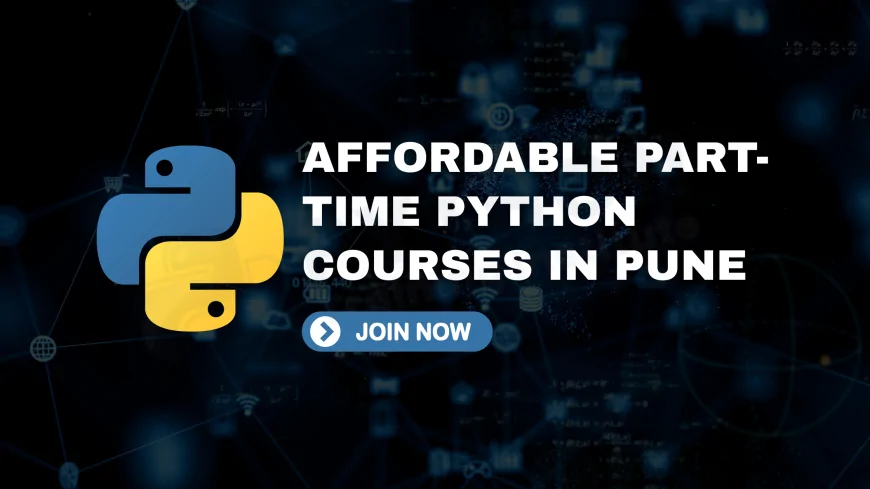Affordable Part-Time Python Courses in Pune for Beginners and Professionals
Discover the best affordable part-time Python courses in Pune designed for beginners, students, and working professionals. Learn at your own pace with flexible batches, hands-on training, and career support from top Python training institutes in Pune.

Python is a language that has transformed industries — from web development and automation to data analysis and artificial intelligence. Its simple syntax and powerful libraries make it ideal for both beginners and professionals. But while Python's popularity continues to rise, many learners struggle to find affordable part-time Python courses that fit into their busy lives.
This blog dives deep into what makes a Python course truly valuable, how to identify a cost-effective and flexible program, and how to maximize learning outcomes without spending a fortune or quitting your day job.
Why Python?
Python is often the first language recommended to aspiring developers, data analysts, and machine learning engineers — and for good reason:
-
Easy to Learn: Readable syntax mimics plain English.
-
Versatile: Works for web apps, APIs, machine learning, scripting, and more.
-
High Demand: Python is consistently in the top 3 most-requested skills in tech job postings.
-
Rich Ecosystem: With thousands of libraries (like NumPy, Pandas, Flask, Django), Python lets you build complex applications quickly.
As such, taking a Python course is one of the best investments you can make — especially if it’s affordable and doesn’t disrupt your job or academic schedule.
The Rise of Part-Time Learning
Not everyone can quit their job or enroll in a full-time program. That’s where part-time learning comes in. It allows learners to build a valuable skill while managing:
-
A 9-to-5 job
-
University coursework
-
Family responsibilities
-
Freelance commitments
Part-time Python courses offer flexibility in pacing, scheduling, and workload — while still teaching real, job-ready skills.
What Makes a Python Course Affordable?
Affordability doesn’t just mean a low price tag. A truly affordable course also delivers value for money. That means:
| Criteria | Why It Matters |
|---|---|
| Up-to-date Curriculum | Covers current Python version, tools, and libraries |
| Real-World Projects | Provides hands-on coding practice, not just theory |
| Self-paced or Flexible Timing | Lets learners work around their schedule |
| One-time or Low Subscription Fee | Reduces ongoing financial burden |
| Access to Practice Tools | Includes IDEs, challenges, and real coding environments |
| Progress Tracking | Helps maintain motivation and measure improvement |
Who Benefits Most from Part-Time Python Courses?
These courses are especially suited for:
| Learner Type | Why Part-Time Python Works |
|---|---|
| Working Professionals | Learn without quitting your job or affecting work performance |
| University Students | Add career-boosting skills while attending college |
| Freelancers | Build tools, apps, and scripts to automate client work |
| Career Switchers | Gain new skills before transitioning industries |
| Hobby Programmers | Learn casually without time pressure |
Affordable part-time Python courses cater to a wide audience, making them ideal for lifelong learners or people taking their first step into tech.
Key Features to Look for in an Affordable Part-Time Python Course
Here are the top features to evaluate when selecting a course:
1. Modular Course Structure
Modular design allows you to take one lesson at a time. Instead of long, overwhelming lectures, each lesson is digestible and targeted.
2. Project-Based Learning
Look for courses that emphasize building real applications — such as:
-
To-do list apps
-
Web scrapers
-
Budget calculators
-
Weather apps using APIs
-
Automations (e.g., batch file renaming)
This kind of experience is essential to building confidence and competence.
3. Interactive Coding Platforms
Courses with embedded coding editors let you practice as you learn. You won’t have to switch between watching a video and opening a separate IDE.
4. Flexible Access
Some courses allow full access from any device — mobile, tablet, or desktop — making it easy to study during commutes, breaks, or evenings.
5. Peer and Community Support
Even part-time learners benefit from support. A course with an active community forum or chat support helps solve blockers and keeps you motivated.
6. Lifetime Access or Minimal Subscription
Avoid courses that lock content behind long-term subscriptions. Look for one-time payments or platforms that charge monthly without requiring a year-long commitment.
Comparing Different Course Types (Cost, Time, Value)
| Course Type | Time Commitment | Average Cost | Real-World Skills | Best For |
|---|---|---|---|---|
| Video Tutorial Series | Flexible, self-paced | Free – $30 one-time | Moderate | Beginners who learn visually |
| Interactive Code Platforms | 3–5 hrs/week | $10–$40/month | High | Learners wanting hands-on practice |
| Project-Based Bundles | 2–4 hrs/week | $25–$100 one-time | Very High | Developers building a portfolio |
| Micro Courses/Workshops | 1–2 hrs/week | Free – $50 total | Moderate | Busy professionals with little time |
There’s no one-size-fits-all approach. You can mix and match depending on your goals and availability.
Learning Outcomes You Can Expect
After completing a good part-time Python course, you should be able to:
-
Understand and use Python syntax confidently
-
Write functions and work with data types
-
Read/write files and handle exceptions
-
Use modules like
datetime,math,random, andos -
Automate basic workflows (like renaming files or generating reports)
-
Make API requests and handle JSON
-
Build basic web apps or command-line tools
Optional advanced modules may also include:
-
Using
Pandasfor data analysis -
Automating Excel or Google Sheets
-
Web scraping with
BeautifulSouporSelenium -
Creating GUIs with
Tkinter
Challenges of Learning Python Part-Time
While this learning path is flexible, it’s not without difficulties.
| Challenge | Strategy to Overcome |
|---|---|
| Inconsistent Schedule | Create a fixed weekly study slot (e.g., Sun–Wed, 7–9 PM) |
| Procrastination | Set short-term milestones, track progress |
| Learning Plateaus | Tackle mini-projects after each major concept |
| No Accountability | Join peer groups or online challenges (like #100DaysOfCode) |
| Resource Overload | Stick with one curated course at a time |
The key to success is discipline and steady progress — not speed.
How to Maximize the Value of an Affordable Course
You’ve chosen a good course — now how do you get the most from it?
1. Follow a Study Plan
Even with part-time courses, consistency is key. Here’s a weekly example for a 12-week course:
| Week | Topics Covered | Time Commitment |
|---|---|---|
| 1 | Python basics: variables, strings | 3 hours |
| 2 | Conditionals, loops | 3 hours |
| 3 | Functions, error handling | 4 hours |
| 4 | Lists, dictionaries, tuples | 4 hours |
| 5 | File operations | 3 hours |
| 6 | Modules and libraries | 4 hours |
| 7 | Mini-project: calculator or quiz app | 5 hours |
| 8 | Web scraping basics | 3 hours |
| 9 | APIs and JSON | 3 hours |
| 10 | Data analysis with Pandas | 4 hours |
| 11 | Automation project | 5 hours |
| 12 | Final project and review | 6 hours |
2. Apply What You Learn
Don’t just watch — build something. For every concept you learn, ask:
-
Can I apply this to automate a task at home or work?
-
Can I create a tool that saves me time?
3. Review and Refactor Your Code
After building projects, go back later to review and clean up your code. This strengthens understanding and introduces better coding habits.
Sample Projects You Can Build During the Course
Here’s a set of hands-on projects suitable for part-time learners:
| Project Name | Concepts Reinforced |
|---|---|
| Daily Expense Tracker | File I/O, dictionaries, user input |
| Weather Forecast CLI Tool | APIs, JSON, string formatting |
| YouTube Video Downloader | Modules, external libraries, GUI (optional) |
| Automated Birthday Reminder | Datetime, loops, email sending |
| CSV Data Sorter | File handling, list sorting, user interface |
These projects not only reinforce learning but also build a personal portfolio to show future employers.
The ROI of a Good Python Course
When it comes to part-time learning, Return on Investment (ROI) isn’t just about job offers. It includes:
-
Saving hours with task automation
-
Creating custom tools for business/freelance work
-
Enhancing your resume with project-based learning
-
Transitioning into tech or data roles
With some courses priced under $50 or even free, the value delivered — in skill acquisition, career impact, and personal development — is extremely high.
FAQ's
1. What are the benefits of enrolling in a part-time Python course in Pune?
Part-time Python courses in Pune offer flexibility for working professionals and students. You can upskill without interrupting your routine. The Python Training Institute in Pune provides weekend and evening batches, hands-on practice, and industry-oriented modules to boost your job-readiness and open doors in software development and data science careers.
2. Are affordable part-time Python courses in Pune suitable for beginners?
Yes, they are perfect for beginners. The curriculum at Python Training Institute in Pune starts with basics like syntax, data types, and loops before advancing to real-time projects. These courses are designed to be beginner-friendly and help students gradually build a strong programming foundation.
3. How much does a part-time Python course cost in Pune?
Part-time Python courses in Pune typically cost between ₹5,000 to ₹15,000, depending on the institute and course duration. The Python Training Institute in Pune is known for offering budget-friendly courses without compromising on quality, providing access to hands-on training and career support.
4. What’s included in the syllabus of part-time Python courses?
The syllabus generally includes Python basics, data structures, OOP concepts, file handling, libraries like NumPy and Pandas, and project work. Python Training Institute in Pune also integrates job-focused modules like database interaction, REST APIs, and coding interview prep to ensure career growth.
5. Can I take weekend Python classes in Pune?
Absolutely! Weekend classes are a popular option at the Python Training Institute in Pune. They’re tailored for working professionals and college students, offering live coding sessions, doubt-clearing classes, and flexible learning schedules at affordable prices.
6. Do part-time Python courses help in getting a job?
Yes, part-time Python courses enhance your employability. The Python Training Institute in Pune provides project-based learning and resume-building support. With skills in Python, you become eligible for roles like software developer, data analyst, and automation tester.
7. Is there placement support after part-time Python training?
Many institutes, including the Python Training Institute in Pune, offer placement assistance. This includes mock interviews, resume writing, portfolio reviews, and job referrals. Their industry tie-ups often lead to internships and job opportunities for deserving candidates.
8. Are online part-time Python courses as effective as offline ones in Pune?
Yes, online part-time courses are equally effective. The Python Training Institute in Pune offers interactive online sessions, recorded lectures, live projects, and mentorship support—giving you flexibility without compromising learning quality or career preparation.
9. How long is a part-time Python course in Pune?
A part-time Python course usually lasts 8 to 12 weeks, depending on the batch and curriculum. The Python Training Institute in Pune offers various options—intensive, fast-track, or regular pace—so learners can choose what best suits their availability and goals.
10. What career roles can I pursue after a part-time Python course?
After completing a part-time Python course, you can apply for roles such as Python Developer, Automation Engineer, Data Analyst, Machine Learning Assistant, and Web Developer. The Python Training Institute in Pune equips you with practical skills to confidently step into the IT industry.
11. Are part-time Python courses in Pune recognized by employers?
Yes, especially when taken from reputed institutes. Employers value practical experience, which is emphasized at Python Training Institute in Pune through capstone projects, assignments, and real-world applications, making your resume stand out in competitive job markets.
12. Can working professionals benefit from part-time Python training?
Definitely! Working professionals can reskill or upskill with part-time Python courses. Python Training Institute in Pune offers industry-aligned training with real use cases that help professionals transition to roles in automation, data analysis, and backend development.
13. What are the key highlights of a good part-time Python course?
Key highlights include hands-on coding sessions, affordable fees, flexible timings, job-oriented curriculum, and experienced instructors. Python Training Institute in Pune ensures each of these elements is covered, plus offers project work and career counseling.
14. Are there any prerequisites for joining a part-time Python course?
No prior experience is needed for most beginner courses. The Python Training Institute in Pune starts with fundamentals and builds up to advanced topics, making it suitable for students, career changers, and even non-technical learners.
15. Will I get a certificate after completing a part-time Python course?
Yes, most part-time Python courses in Pune, including those by Python Training Institute, offer completion certificates. These certificates can add value to your resume and LinkedIn profile and may help during interviews or job applications.
16. How is the faculty quality at Python Training Institute in Pune?
The faculty at Python Training Institute in Pune consists of experienced professionals with real-world expertise. They guide students with hands-on coding sessions, mentorship, and industry insights that prepare learners for real tech roles.
17. Can I switch to full-time training later if needed?
Yes, many institutes allow switching between part-time and full-time modes. Python Training Institute in Pune is known for flexible learning pathways where learners can switch schedules or even upgrade their course based on career goals.
18. What type of projects are included in the part-time course?
Projects typically include real-world applications like building calculators, web scrapers, REST APIs, automation scripts, and data dashboards. Python Training Institute in Pune emphasizes project-based learning to help students apply their skills and build a portfolio.
19. Do part-time Python courses cover advanced topics?
Yes, depending on the course level. Many part-time courses offered by Python Training Institute in Pune include intermediate to advanced topics such as OOP, decorators, generators, modules, and database handling, catering to both beginners and upskillers.
20. How can I choose the best part-time Python course in Pune?
Look for affordability, a structured syllabus, placement support, practical projects, and flexible timings. Python Training Institute in Pune ticks all these boxes, offering comprehensive training aligned with job market needs and student convenience.
Final Thoughts
Python is a modern essential — a tool for building, automating, analyzing, and innovating. But learning it doesn’t have to break the bank or require quitting your job.
Affordable part-time Python courses provide:
-
The flexibility of learning at your own pace
-
The freedom to work around a full-time schedule
-
Real-world skills for real-world problems
-
A low-risk, high-reward way to enter the world of programming
Whether you're aiming to automate office tasks, transition to a tech role, or just build your first app — the right course can empower you with one of the most versatile programming languages today.
Choose wisely, stay consistent, and invest in your skills.
Python is not just a language — it’s your gateway to the future.
What's Your Reaction?
 Like
0
Like
0
 Dislike
0
Dislike
0
 Love
0
Love
0
 Funny
0
Funny
0
 Angry
0
Angry
0
 Sad
0
Sad
0
 Wow
0
Wow
0














